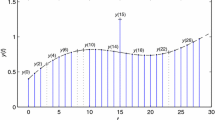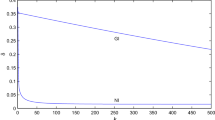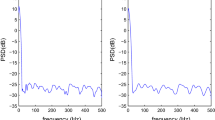Abstract
This paper studies the modeling of multi-frequency signals based on measured data. With the use of the hierarchical identification principle and the iterative search, several iterative parameter estimation algorithms are derived for the signal models with the known frequencies and the unknown frequencies. For the multi-frequency signals, the hierarchical estimation algorithms are derived by means of parameter decomposition. Through the decomposition, the original optimization problem is transformed into the combination of the nonlinear optimization and the linear optimization problems. The simulation results show that the proposed hierarchical algorithms have better performance than the overall estimation algorithms without parameter decomposition.








Similar content being viewed by others
References
D. Belega, D. Petri, Sine-wave parameter estimation by interpolated DFT method based on new cosine windows with high interference rejection capability. Digital Signal Process. 33, 60–70 (2014)
D. Belega, D. Petri, Accuracy analysis of the sine-wave parameters estimation by means of the windowed three-parameter sine-fit algorithm. Digital Signal Process. 50, 12–23 (2016)
S. Bonettini, M. Prato, S. Rebegoldi, A cyclic block coordinate descent method with generalized gradient projections. Appl. Math. Comput. 286, 288–300 (2016)
X. Cao, D.Q. Zhu, Multi-AUV task assignment and path planning with ocean current based on biological inspired self-organizing map and velocity synthesis algorithm. Intell. Autom. Soft Comput. 23(1), 31–39 (2017)
X. Cao, D.Q. Zhu, S.X. Yang, Multi-AUV target search based on bioinspired neurodynamics model in 3-D underwater environments. IEEE Trans. Neural Netw. Learn. Syst. 27(11), 2364–2374 (2016)
M. Chen, F. Ding, L. Xu, T. Hayat, A. Alsaedi, Iterative identification algorithms for bilinear-in-parameter systems with autoregressive moving average noise. J. Franklin Inst. 354(17), 7885–7898 (2018)
Z.Z. Chu, D.Q. Zhu, S.X. Yang, Observer-based adaptive neural network trajectory tracking control for remotely operated vehicle. IEEE Trans. Neural Netw. Learn. Syst. 28(7), 1633–1645 (2017)
Z.Z. Chu, D.Q. Zhu, S.X. Yang, Adaptive sliding mode control for depth trajectory tracking of remotely operated vehicle with thruster nonlinearity. J. Navig. 70(1), 149–164 (2017)
F. Ding, X.H. Wang, L. Mao, L. Xu, Joint state and multi-innovation parameter estimation for time-delay linear systems and its convergence based on the Kalman filtering. Digit. Signal Process. 62, 211–223 (2017)
F. Ding, F.F. Wang, L. Xu, M.H. Wu, Decomposition based least squares iterative identification algorithm for multivariate pseudo-linear ARMA systems using the data filtering. J. Franklin Inst. 354(3), 1321–1339 (2017)
F. Ding, L. Xu, Q.M. Zhu, Performance analysis of the generalised projection identification for time-varying systems. IET Control Theory Appl. 10(18), 2506–2514 (2016)
F. Ding, F.F. Wang, T. Hayat, A. Alsaedi, Parameter estimation for pseudo-linear systems using the auxiliary model and the decomposition technique. IET Control Theory Appl. 11(3), 390–400 (2017)
L. Feng, M.H. Wu, Q.X. Li et al., Array factor forming for image reconstruction of one-dimensional nonuniform aperture synthesis radiometers. IEEE Geosci. Remote Sens. Lett. 13(2), 237–241 (2016)
F. Gianfelici, G. Biagetti, P. Crippa, C. Turchetti, Multicomponent AM–FM representations: an asymptotically exact approach. IEEE Trans. Audio Speech Lang. Process. 15(3), 823–837 (2007)
M.L.N. Goncalves, J.G. Melo, A Newton conditional gradient method for constrained nonlinear systems. J. Comput. Appl. Math. 311, 473–483 (2017)
Y. Hu, Iterative and recursive least squares estimation algorithms for moving average systems. Simul. Model. Pract. Theory 34, 12–19 (2013)
N.E. Huang, Z. Shen, S.R. Long et al., The empirical mode decomposition and the Hilbert spectrum for nonlinear and non-stationary time series analysis. Proc. R. Soc. A Math. Phys. Eng. Sci. 454(1971), 903–995 (1998)
Y. Ji, F. Ding, Multiperiodicity and exponential attractivity of neural networks with mixed delays. Circuits Syst Signal Process. 36(6), 2558–2573 (2017)
X.F. Li, Y.D. Chu, A.Y.T. Leung, H. Zhang, Synchronization of uncertain chaotic systems via complete-adaptive-impulsive controls. Chaos Solitons Fractals 100, 24–30 (2017)
L. Li, S.X. Ding, Y. Zhang, Y. Yang, Optimal fault detection design via iterative estimation methods for industrial control systems. J. Franklin Inst. 353(2), 359–377 (2016)
M.H. Li, X.M. Liu et al., The maximum likelihood least squares based iterative estimation algorithm for bilinear systems with autoregressive noise. J. Franklin Inst. 354(12), 4861–4881 (2017)
M.H. Li, X.M. Liu et al., Least-squares-based iterative and gradient-based iterative estimation algorithms for bilinear systems. Nonlinear Dyn. 89(1), 197–211 (2017)
M.H. Li, X.M. Liu et al., The gradient based iterative estimation algorithms for bilinear systems with autoregressive noise. Circuits Syst. Signal Process. 36(11), 4541–4568 (2017)
H. Li, Y. Shi, W. Yan, On neighbor information utilization in distributed receding horizon control for consensus-seeking. IEEE Trans. Cybern. 46(9), 2019–2027 (2016)
H. Li, Y. Shi, W. Yan, Distributed receding horizon control of constrained nonlinear vehicle formations with guaranteed \(\gamma \)-gain stability. Automatica 68, 148–154 (2016)
G. Li, C. Wen, W. Zheng, G. Zhao, Iterative identification of block-oriented nonlinear systems based on biconvex optimization. Syst. Control Lett. 79, 68–75 (2015)
H. Li, W.S. Yan, Y. Shi, Continuous-time model predictive control of under-actuated spacecraft with bounded control torques. Automatica 75, 144–153 (2016)
J.H. Li, W.X. Zheng, J.P. Gu, L. Hua, Parameter estimation algorithms for Hammerstein output error systems using Levenberg–Marquardt optimization method with varying interval measurements. J. Franklin Inst. 354(1), 316–331 (2017)
W. Liu, State estimation for discrete-time Markov jump linear systems with time-correlated measurement noise. Automatica 76, 266–276 (2017)
Y.W. Mao, F. Ding, Multi-innovation stochastic gradient identification for Hammerstein controlled autoregressive autoregressive systems based on the filtering technique. Nonlinear Dyn. 79(3), 1745–1755 (2015)
Y.W. Mao, F. Ding, A novel parameter separation based identification algorithm for Hammerstein systems. Appl. Math. Lett. 60, 21–27 (2016)
J. Pan, X. Jiang, X.K. Wan, W. Ding, A filtering based multi-innovation extended stochastic gradient algorithm for multivariable control systems. Int. J. Control Autom. Syst. 15(3), 1189–1197 (2017)
J. Pan, X.H. Yang, H.F. Cai, B.X. Mu, Image noise smoothing using a modified Kalman filter. Neurocomputing 173, 1625–1629 (2016)
X. Pan, H. Zhao, W. Zou, Y. Zhou, J. Ma, J. Wang, F. Hu, Frequency estimation of discrete time signals based on fast iterative algorithm. Measurement 82, 461–465 (2016)
C. Park, S.B. Kim, Virtual metrology modeling of time-dependent spectroscopic signals by a fused lasso algorithm. J. Process Control 42, 51–58 (2016)
Z. Sadeghigol, M.H. Kahaei, F. Haddadi, Generalized beta Bayesian compressive sensing model for signal reconstruction. Digital Signal Process. 60, 163–171 (2017)
A.A. Syed, Q. Sun, H. Foroosh, Frequency estimation of sinusoids from nonuniform samples. Signal Process. 129, 67–81 (2016)
X.K. Wan, Y. Li, C. Xia, M.H. Wu, J. Liang, N. Wang, A T-wave alternans assessment method based on least squares curve fitting technique. Measurement 86, 93–100 (2016)
D.Q. Wang, Hierarchical parameter estimation for a class of MIMO Hammerstein systems based on the reframed models. Appl. Math. Lett. 57, 13–19 (2016)
X.H. Wang, F. Ding, Recursive parameter and state estimation for an input nonlinear state space system using the hierarchical identification principle. Signal Process. 117, 208–218 (2015)
X.H. Wang, F. Ding, Convergence of the recursive identification algorithms for multivariate pseudo-linear regressive systems. Int. J. Adapt. Control Signal Process. 30(6), 824–842 (2016)
Y.J. Wang, F. Ding, L. Xu, Some new results of designing an IIR filter with colored noise for signal processing. Digital Signal Process. 72, 44–58 (2018)
D.Q. Wang, Y.P. Gao, Recursive maximum likelihood identification method for a multivariable controlled autoregressive moving average system. IMA J. Math. Control Inf. 33(4), 1015–1031 (2016)
D.Q. Wang, L. Mao et al., Recasted models based hierarchical extended stochastic gradient method for MIMO nonlinear systems. IET Control Theory Appl. 11(4), 476–485 (2017)
Y. Wang, W. Wei, J. Xiang, Multipoint interpolated DFT for sine waves in short records with DC components. Signal Process. 131, 161–170 (2017)
Y. Wang, H. Zhang, S. Wei, D. Zhou, B. Huang, Control performance assessment for ILC-controlled batch processes in two-dimensional system framework. IEEE Trans. Syst. Man Cybern. Syst. (2017). https://doi.org/10.1109/TSMC.2017.2672563
J.D. Wang, Q.H. Zhang, L. Ljung, Revisiting Hammerstein system identification through the two-stage algorithm for bilinear parameter estimation. Automatica 45(11), 2627–2633 (2009)
Y. Wang, D. Zhao, Y. Li, S.X. Ding, Unbiased minimum variance fault and state estimation for linear discrete time-varying two-dimensional systems. IEEE Trans. Autom. Control 62(10), 5463–5469 (2017)
L. Xu, A proportional differential control method for a time-delay system using the Taylor expansion approximation. Appl. Math. Comput. 236, 391–399 (2014)
L. Xu, The damping iterative parameter identification method for dynamical systems based on the sine signal measurement. Signal Process. 120, 660–667 (2016)
L. Xu, Application of the Newton iteration algorithm to the parameter estimation for dynamical systems. J. Comput. Appl. Math. 288, 33–43 (2015)
L. Xu, The parameter estimation algorithms based on the dynamical response measurement data. Adv. Mech. Eng. 9, 1–12 (2017). https://doi.org/10.1177/1687814017730003
L. Xu, L. Chen, W.L. Xiong, Parameter estimation and controller design for dynamic systems from the step responses based on the Newton iteration. Nonlinear Dyn. 79(3), 2155–2163 (2015)
L. Xu, F. Ding, Recursive least squares and multi-innovation stochastic gradient parameter estimation methods for signal modeling. Circuits Syst. Signal Process. 36(4), 1735–1753 (2017)
L. Xu, F. Ding, Parameter estimation for control systems based on impulse responses. Int. J. Control Autom. Syst. (2017). https://doi.org/10.1007/s12555-016-0224-2
L. Xu, F. Ding, Y. Gu, A. Alsaedi, T. Hayat, A multi-innovation state and parameter estimation algorithm for a state space system with d-step state-delay. Signal Process. 140, 97–103 (2017)
L. Xu, F. Ding, The parameter estimation algorithms for dynamical response signals based on the multi-innovation theory and the hierarchical principle. IET Signal Process. 11(2), 228–237 (2017)
N. Zhao, M.H. Wu, J.J. Chen, Android-based mobile educational platform for speech signal processing. Int. J. Electr. Eng. Educ. 54(1), 3–16 (2017)
Acknowledgements
This work was supported by the Natural Science Fund for Colleges and Universities in Jiangsu Province (No. 16KJB120007) and sponsored by the Qing Lan Project of Jiangsu Province, the National Natural Science Foundation of China (No. 61293194, 61773182) and the Natural Science Foundation of Jiangsu Province (No. BK20160162).
Author information
Authors and Affiliations
Corresponding author
Rights and permissions
About this article
Cite this article
Xu, L., Ding, F. Iterative Parameter Estimation for Signal Models Based on Measured Data. Circuits Syst Signal Process 37, 3046–3069 (2018). https://doi.org/10.1007/s00034-017-0705-4
Received:
Revised:
Accepted:
Published:
Issue Date:
DOI: https://doi.org/10.1007/s00034-017-0705-4




